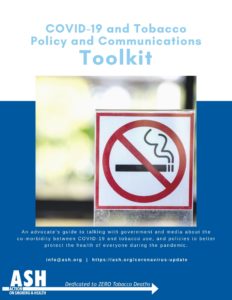
COVID-19 and Tobacco Policy and Communications Toolkit
We are in the midst of an historic pandemic, and governments are taking unprecedented measures to mitigate the death toll. Smokers face a particular challenge – data strongly suggests a significant co-morbidity between smoking and serious complications from exposure to the coronavirus.
ASH’s COVID-19 and Tobacco Policy and Communications Toolkit provides advocates with a summary of current research, policies to protect their citizens from tobacco during lockdowns, and samples for media outreach and social media engagement.
Read the Toolkit here.
Since COVID-19 attacks the lungs, and, as we are learning, other critical organs like the heart and kidneys, any activity that damages or weakens these organs increases the risk of hospitalization and death. Although there is less data than for smoking, it is likely that people who vape and those exposed to secondhand smoke or vape aerosol (and other airborne toxins) are also at increased risk.
Social distancing seems to be the key to “flattening the curve” of the COVID-19 pandemic, relieving stress on health systems and allowing more lives to be saved. As part of this effort, governments face decisions on what activities are “essential,” since any activity outside the home undermines social distancing.
 Tobacco is arguably the least essential business in the world, and to declare its production and sale an essential activity is to prioritize a deadly commercial product that provides no benefit. Many jurisdictions continue to provide access to cessation therapy such as behavioral treatment (much of which can be accessed online or by phone) and nicotine-replacement (NRT) products (which can often be delivered to homes).
Tobacco is arguably the least essential business in the world, and to declare its production and sale an essential activity is to prioritize a deadly commercial product that provides no benefit. Many jurisdictions continue to provide access to cessation therapy such as behavioral treatment (much of which can be accessed online or by phone) and nicotine-replacement (NRT) products (which can often be delivered to homes).
Allowing “business as usual” for Big Tobacco at this time is madness. As the World Health Organization (WHO) tweeted, tobacco products are “not essential during COVID-19 or ever.”
Posted: April 24, 2020
Edit May 5, 2020: The Lippi reference has been removed from the Toolkit, as it was debunked here.








